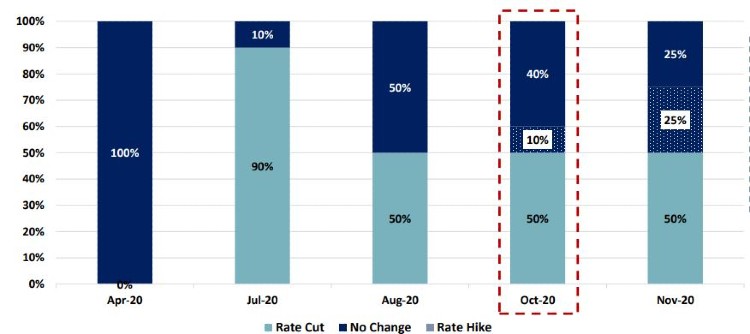October, 19, 2020

First Capital Research believes that the Central Bank of Sri Lanka (CBSL) will maintain the same policy stance in this monetary policy review, but given the concerns around economic growth, the research arm stated that the CBSL is likely to retain the monetary policy stance at “accommodative”.
“As per our view, CBSL either can choose to hold policy rates steady or cut by a 25bps or 50bps while, hike is off the table due to the lackluster economic growth. We believe that there is a 50% probability to hold rates due to improvement in high frequency indicators. Moreover, there is a 25% probability for 25bps and 50 bps respectively to support economic growth,” the research firm said in its latest report.
At the last policy meeting held on Aug 2020, CBSL maintained its accommodative monetary policy stance, particularly as market lending rates are yet to reflect the full pass through of policy easing measures implemented thus far.
The next CBSL’s monetary policy review is scheduled to be announced on 22nd October 2020 at 07.30 am.
Meanwhile, First Capital Research estimates that Sri Lanka’s GDP would see its steepest contraction in history of -5.8% in 2020 following the unexpected contraction in 1Q GDP growth of -1.6%.
“Amidst the lack of demand for credit, import restrictions, and the slowness in recovery of consumer demand, GDP growth is expected to turn positive only by 4Q of 2020. Accordingly, GDP growth can be considered as a major factor favoring the further policy easing at the up coming review.” It added.
The research firm also expects Sri Lanka’s budget deficit in 2020 to reach 10% of GDP.
Generally fiscal deficit is funded via domestic and foreign sources of borrowing. Lack of FDI and limited foreign borrowing options in the current period may push the Govt. to borrow predominately from the domestic market. Decline in domestic interest rates in response to the aggressive monetary easing delivered the required support to soften the pandemic impact on the economy,” it said.
“Thereby, maintaining low interest rate environment or further reducing interest rate to benefits the Govt. finances,” it added.
Video Story